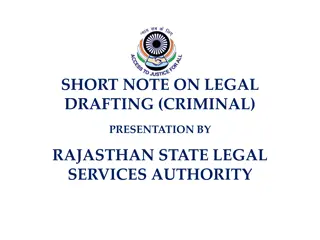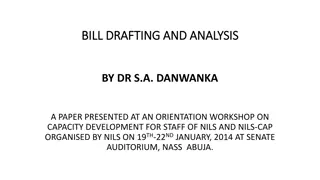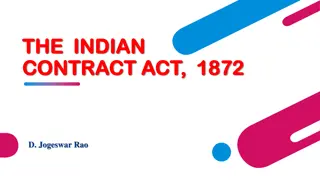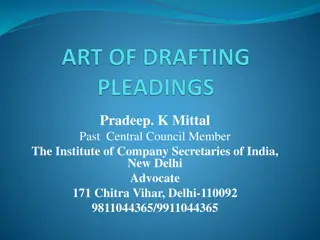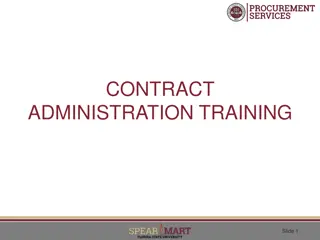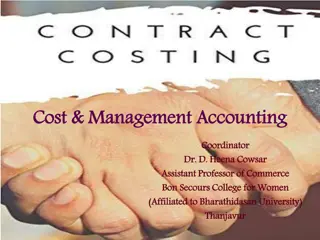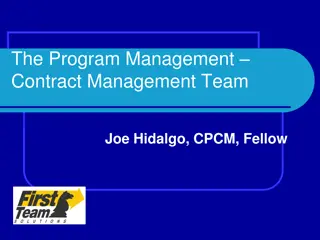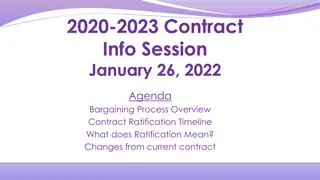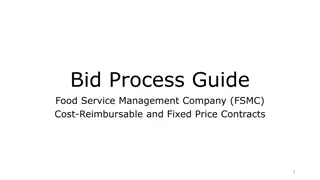Essentials of Contract Drafting and Principles for Effective Drafting
Contracts form the basis of business dealings, and the art of contract drafting involves outlining the obligations of parties concisely to avoid ambiguity. This process ensures clarity and understanding of legal rights and duties. Additionally, conveying rights through deeds in real estate differs from contracts as it focuses on property transfer. The elements of representations, warranties, and covenants play crucial roles in contracts. Effective drafting principles such as brevity, clarity, and simplicity are essential for creating understandable and precise contracts. The rules of construction guide the interpretation of contracts in a reasonable and favorable manner.
Download Presentation

Please find below an Image/Link to download the presentation.
The content on the website is provided AS IS for your information and personal use only. It may not be sold, licensed, or shared on other websites without obtaining consent from the author. Download presentation by click this link. If you encounter any issues during the download, it is possible that the publisher has removed the file from their server.
E N D
Presentation Transcript
INTRODUCTION TO CONTRACT DRAFTING Saptarshi Das Assistant Professor of Law
What is contract drafting? Contracts are the foundations of the business world and may range from a simple to a complex contract Drafting a contract is the act of writing the details of the contract in order to outline the obligations of both the parties to the contract in order to make them understand their legal rights and responsibilities. Goal of Contract Drafting : To make each parties understand the terms and conditions of the contract. To ensure clarity and remove any ambiguity, the language used in the drafting of the contracts must be simple, clear and specific.
Drafting ,Conveyancing vis--vis Contract Drafting Drafting in very simple terms is the crystallization of the law and the fact in the language form. In the legal sense it means the preparation of legal documents like contracts, agreements, deeds etc. Conveyancing is the art of drafting deeds whereby land or interest in land i.e. immovable property is transferred from one person to the other. Conveyance is not a contract. Contract remains to be performed and its specific performance could be sought while the basic purpose of conveyance is to transfer the property from one person to another.
Representations, Warranties and Covenants Representations are statements of past or present fact or circumstance. It s a contractual statement that a fact or circumstance is presently true, and/or has been true in the past. Warranties are statements or promise of current and future condition. It s a contractual statement that a condition is, and/or will be, true when made and/or for a period of time, often for the term of the agreement. Covenants are promises of future action or inaction. It s a contractual statement that a party will do, or will not do, something during a period of time (often the term of the agreement). Eg. : Party A shall issue a press release announcing the relationship within 30 calendar days of the Effective Date
Some principles of effective drafting Brevity : A contract should be brief, precise and to the point Clarity : It should clearly lay down the terms and conditions of the contract so as to prevent any ambiguity Simplicity : A contract should be written in simple language to make it convenient for both the parties to understand the same.
RULES OF CONSTRUCTION 1) Whatever sense may be adopted, the construction must be reasonable; 2) The construction shall be liberal; 3) The construction shall be favourable; 4) The popular meaning of words shall be adopted; 5) The whole of the agreement must be carefully considered; 6) The contract shall be taken most strongly against the contractor;
CONTRACT NEGOTIATION Contract negotiations are a process that involves discussing and compromising on contract terms in order to reach a final agreement between two or more parties involved in a transaction. In most contract negotiations, each party tries to negotiate for the best interest of themselves or their business. There is a lot of back and forth communication, but most contract factors boil down to risks and revenues
Best Approach to Contract Negotiations? Identify the objective for entering the contract: Every party to the contract must have a specific idea of what they want to gain from the transaction. Before attempting to negotiate a contract, make a lost of things you will compromise and a list of terms that you will not negotiate or give up. Research contract laws: Contracts are legally binding agreements, which are regulated by the courts. Before attempting to negotiate a deal, search online or get expert advice to determine whether the terms of the contract you are trying to form is legally allowed. Prepare for negotiations: Gather all facts, figures, financial statements, and documents for the negotiation process in case you need to show proof of anything that you may need to back up your negotiation points. Prepare a backup plan: Create a plan for the possibility that the contract fails to form and that both side cannot agree on the terms after negotiation. List your priorities: It is important to know the difference between what you need out of the transaction and what you want. Set a goal: Know your bottom line so you can determine when to accept a deal and when to walk away.
Some ethical issues of contract drafting Business contracts are legally binding documents, they are only effective within an ethical framework that assumes most parties observe and fulfill their contractual obligations. Competing for, obtaining and satisfying contracts ethically is the basis for an efficiently functioning economy
Some ethical issues of contract drafting Determining Prices Ethically : An ethically negotiated contract strikes a balance between the benefits to the supplier and purchaser. The successful execution of such a contract delivers advantages to both parties, and both parties have a stake in avoiding problems. Eg: Setting the prices for your contracts in this way is ethical, while basing your prices on manipulation or hidden factors is not
Some ethical issues of contract drafting Avoiding Conflicts of Interest : Some conflicts of interest are ethically unacceptable, such as bidding on work for which you decide who is awarded the contract, but you can avoid other types of conflict of interest with transparency. Competing Fairly : A competitive market gives you feedback on the value you are offering to customers as compared with your competitors. When you obtain a contract through fair competition, you know that you have been successful in presenting exceptional value. When a competitor receives the contract, you have to work on reducing prices or increasing quality. Observing Laws and Regulations : Laws and regulations protect the consumer, employees and other market participants. When you develop an offer and sign a contract, you have to keep legal and regulatory constraints in mind.
SOME SAMPLE CONTRACTS Drafting of Agreements. ( Loan Agreement) Drafting of a Sale Agreement for immovable property. Drafting of an Agreement under the Trust Act Drafting of Standard form of Contract Drafting of an Adoption Agreement. Drafting of a sale agreement for movable property.






